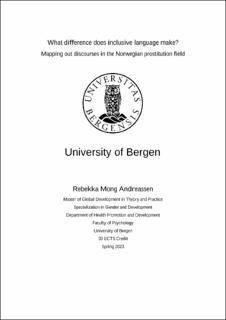| dc.description.abstract | People in prostitution are frequently referred to in derogatory and condescending ways. Contemporary debates on prostitution have been characterized by diverging feminist approaches. These approaches are rooted in contesting assumptions about prostitution, and policies. At the same time, poverty, the upsurge in natural disasters, and wars increase the risk for vulnerable people to get sex trafficked, something that has made human trafficking and prostitution closely linked together. Norway has a unique approach to prostitution policy and have what is called a “Sex Purchase Act”. This act criminalizes buying sex, while selling sex is legal. The debates about prostitution, and how we talk about people in prostitution are particularly interesting in a time when people are opposing “wokeness”, and what is perceived as a way of policing language. This thesis aims to explore how organisations working in the fields of prostitution and/or human trafficking experience the prostitution discourse. Additionally, it aims to explore why it is important to care about discourse, especially in relation to marginalized groups. Data was collected through a qualitative study which included five in-depth interviews with seven participants, representing different organisations in the field. The data was coded inductively, using discourse analysis and empowerment as the conceptual frameworks. All the organisations made attempts to not use terms that they themselves find stigmatising or ill-fitting for them as an organisation to use. For instance, all organisations have shifted from using the term “prostitute” as it is perceived as negatively framing a person in prostitution. However, all organisations still use the term “prostitution”, since it does not say anything about the person involved. Furthermore, the thesis explores and discusses how the organisations talk about the term “sex work”, and the binary categories of “helpless victim” and “happy sex worker” that have been proposed by public media. This study proposes that being conscious about discourse is a tool for the organisations to care about their clients. It is also important to understand that all the organisations’ reflections are based on their own discursive realities. | |
